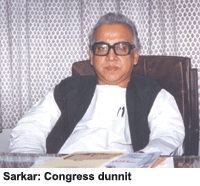Within less than a month of being sworn in as chief minister of West Bengal after the Trinamool Congress party ended 34 years of uninterrupted rule of the Communist Party of India-Marxist (CPM)-led Left Front government in the state, Mamata Banerjee announced that English language teaching will begin in class I in all 49,986 government primary schools in the state (pop. 91.2 million), and that English will become a compulsory subject from class III. This announcement made on June 17 has been widely welcomed by academics and educators across West Bengal.
 The Left Front government’s directive to abolish English in primary schools (class I-VII) was one of its first policy decisions following its historic win in the post-Emergency election. Shortly after it assumed office in Writers’ Building in 1977, the first Left Front government appointed a one-man commission headed by Prof. Pabitra Sarkar, former vice chancellor of Kolkata-based Rabindra Bharati University, to suggest a policy for the teaching of English. The Sarkar Commission predictably recommended that it wasn’t a good idea to teach a “foreign” language to children in primary school. Accordingly, the teaching of English was banned — even as a second language — in the state’s primary schools for 34 years.
The Left Front government’s directive to abolish English in primary schools (class I-VII) was one of its first policy decisions following its historic win in the post-Emergency election. Shortly after it assumed office in Writers’ Building in 1977, the first Left Front government appointed a one-man commission headed by Prof. Pabitra Sarkar, former vice chancellor of Kolkata-based Rabindra Bharati University, to suggest a policy for the teaching of English. The Sarkar Commission predictably recommended that it wasn’t a good idea to teach a “foreign” language to children in primary school. Accordingly, the teaching of English was banned — even as a second language — in the state’s primary schools for 34 years.
The consequences of this ill-considered decision taken three decades ago, compounded by the “extreme reluctance” of the Left Front government to grant NOCs (no-objection certificates) to English-medium primary-secondaries, have been disastrous. An entire generation with inadequate English-language proficiency has come of age in Communist-ruled West Bengal precipitating a massive exodus of middle class citizens from the state, creating mass unemployment and simulta-neous shortages of skilled labour which in turn blocked industrial investment.
“English had always been taught in primary schools in West Bengal prior to 1977. The abolition of English in public primary education forced the poor onto a less-than-level playing field. It also made students from Bengali-medium primaries diffident, socially insecure, and dependent on state and political patronage once they completed their education,” explains Dr. Swapan Chakraborty, the Oxford-educated former professor of English at Jadavpur University and currently director of the National Library, Kolkata (estb.1836).
Asked by your correspondent why he had recommended abolition of English in primary education 34 years ago, Sarkar denies the first Left Front government was responsible for this decision. He blames the Left Front’s almost forgotten predecessor Congress regime (1972-77). “The Left Front only implemented the Congress recommendation which academia supported,” he says.
Now that English language teaching has been introduced from class I, the challenge before the newly inducted Mamata Banerjee government is to find English proficient teachers from within West Bengal’s 1.03 million teachers who were themselves denied English-medium instruction in some cases upto class X. “I don’t know how English-teaching skills can be imparted to over 100,000 or more teachers who have to teach English in primary schools. The only option is to re-train them to teach English, as now even the poor are demanding English-medium — and not merely English language — education for their children,” says Chakraborty.
But that’s not the CPM’s headache now; it’s Mamata Banerjee’s.
Sujoy Gupta (Kolkata)